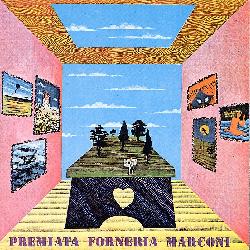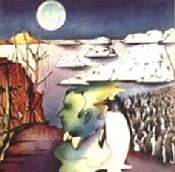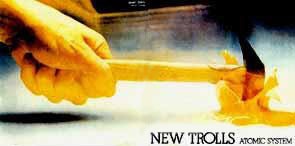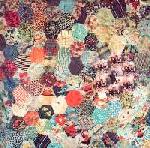 While I
would much rather talk about Le Orme, the movement’s appointed social
commentators, who put out a number of indisputable classics in the early
’70s, yet it is especially vital to dwell here on PFM – i.e.
Premiata Forneria Marconi, or ‘Marconi’s Prize-Winning Bakery’ –
in other words the most prestigious Itaprog act of all. PFM may yet beat
out Le Orme for most Itaprog record sales, and I suppose that matters
in the sense that both bands concentrated on deriving musical quality
from artistic sensitivity, and both succeeded with the public, showing
themselves capable of walking the dog instead of vice versa, as it were.
It is also relevant that with PFM, we’re in a position to identify
one record particularly deserving of attention in terms of its classic
proportions, making our task of commentary relatively simple. That is
not the case with Le Orme, where there are at least three classics for
the reviewer to choose from, each with its peculiarities – not that
the term ‘classic’ should necessarily be withheld from any other
PFM disc. It is also true that this band was heard widely outside Italy
– a virtually unique situation demanding comment – especially
their ultra-progressive The World Became The World, but also Photos
of Ghosts, which is nothing other than an English-language reworking
of probably their finest Italian record, Per Un Amico (1972), currently
under discussion and depicted above. So there appear to be several reasons
for preferring a PFM review to a Le Orme review.
While I
would much rather talk about Le Orme, the movement’s appointed social
commentators, who put out a number of indisputable classics in the early
’70s, yet it is especially vital to dwell here on PFM – i.e.
Premiata Forneria Marconi, or ‘Marconi’s Prize-Winning Bakery’ –
in other words the most prestigious Itaprog act of all. PFM may yet beat
out Le Orme for most Itaprog record sales, and I suppose that matters
in the sense that both bands concentrated on deriving musical quality
from artistic sensitivity, and both succeeded with the public, showing
themselves capable of walking the dog instead of vice versa, as it were.
It is also relevant that with PFM, we’re in a position to identify
one record particularly deserving of attention in terms of its classic
proportions, making our task of commentary relatively simple. That is
not the case with Le Orme, where there are at least three classics for
the reviewer to choose from, each with its peculiarities – not that
the term ‘classic’ should necessarily be withheld from any other
PFM disc. It is also true that this band was heard widely outside Italy
– a virtually unique situation demanding comment – especially
their ultra-progressive The World Became The World, but also Photos
of Ghosts, which is nothing other than an English-language reworking
of probably their finest Italian record, Per Un Amico (1972), currently
under discussion and depicted above. So there appear to be several reasons
for preferring a PFM review to a Le Orme review.
 I don’t
think it’s going to offend anyone if we dub 1973’s record Io
sono Murple, by Murple, a classic. Probably not all that many have
heard it anyway. The instruments are all very well played, always searching
for a situation where they can rock out. In Antarctica, I guess this is
actually a way of keeping warm. Perhaps for this reason, the music is
continuous throughout. Usually we find the Italians seeking to impress
the listener with excellence in technique and crafted collaboration among
performers, and if it is possible to level a criticism, well, there is
a tendency to forget about rocking out, as though they didn’t know
how to do it, didn’t think it was a useful thing to do, or thought
they were actually doing it anyway. So Murple is looking to make up for
that, and they make sure they have a fine set of compositions, with plenty
of contrast, carefully interwoven for continuity. The music is actually
a fable concerning the penguin Murple. To judge from the section title,
“Senza Un Perchè”, Murple is a philosopher penguin on
a quest. You can also see from the cover that he is a leader of penguins,
because he has a personality that moves before him.
I don’t
think it’s going to offend anyone if we dub 1973’s record Io
sono Murple, by Murple, a classic. Probably not all that many have
heard it anyway. The instruments are all very well played, always searching
for a situation where they can rock out. In Antarctica, I guess this is
actually a way of keeping warm. Perhaps for this reason, the music is
continuous throughout. Usually we find the Italians seeking to impress
the listener with excellence in technique and crafted collaboration among
performers, and if it is possible to level a criticism, well, there is
a tendency to forget about rocking out, as though they didn’t know
how to do it, didn’t think it was a useful thing to do, or thought
they were actually doing it anyway. So Murple is looking to make up for
that, and they make sure they have a fine set of compositions, with plenty
of contrast, carefully interwoven for continuity. The music is actually
a fable concerning the penguin Murple. To judge from the section title,
“Senza Un Perchè”, Murple is a philosopher penguin on
a quest. You can also see from the cover that he is a leader of penguins,
because he has a personality that moves before him.
 The New
Trolls were the most experimental Italian pop-rock band of the late 60s.
They then contributed to the rise of Italian prog with their classical
take-off, Concerto Grosso, of 1971. But their music was extraordinarily
virile – often observably simpler and with far rougher edges than
other bands – and it can sometimes be difficult to accept them as
integral to the same prog wave as other apparently more refined bands,
even if the Trolls were all first-rate musicians. In 1973 they split into
Ibis and Atomic System factions. The album N.T. Atomic System sounds
like typical New Trolls, hard and heavy, rocking along nicely. But once
you start getting into it, you begin to realize that it is one of the
very best, a cornerstone of Italian prog, just for the sake of its spirit.
An especially brilliant track is “Quando L’erba Vestiva La Terra”:
it is the artist’s act of communion with Mother Nature. Agreed, there’s
a lot of imperfection here, but the heights that are scaled can be breathtaking.
The New
Trolls were the most experimental Italian pop-rock band of the late 60s.
They then contributed to the rise of Italian prog with their classical
take-off, Concerto Grosso, of 1971. But their music was extraordinarily
virile – often observably simpler and with far rougher edges than
other bands – and it can sometimes be difficult to accept them as
integral to the same prog wave as other apparently more refined bands,
even if the Trolls were all first-rate musicians. In 1973 they split into
Ibis and Atomic System factions. The album N.T. Atomic System sounds
like typical New Trolls, hard and heavy, rocking along nicely. But once
you start getting into it, you begin to realize that it is one of the
very best, a cornerstone of Italian prog, just for the sake of its spirit.
An especially brilliant track is “Quando L’erba Vestiva La Terra”:
it is the artist’s act of communion with Mother Nature. Agreed, there’s
a lot of imperfection here, but the heights that are scaled can be breathtaking.
 The concept
of Darwin!, by Banco del Mutuo Soccorso, was presumably still revolutionary
in 1973 when this record came out. Nothing came from Almighty God, but
Creation was created by and from itself – that’s how the lyrics
start out. But I don’t think Banco had an axe to grind at all. The
whole thing is quite whimsical. I guess they wanted a theme where they
could sing to words that wouldn’t impose anything on anyone. That
meant the singer (– one Francesco Di Giacomo, who allegedly appeared in a Fellini
film, although I can’t verify that –) could make his voice sound natural. Then the other performers
could concentrate on making music that just sounded good. Even if the
theory of evolution is sometimes disputed with regard to its scientific
content, Darwin and his observations always make for an interesting and
edifying presentation of factual material. And Banco lives up to its agreements
on that score, by carefully crafting widely varying musical textures.
The music is never hurried, except perhaps in the early part, where it
is probably trying to represent Darwin’s intellectual agitation on
perceiving and originally pursuing the theory of evolution. This, the
second Banco LP, is definitely a classic, regardless how one views other
LPs by this band.
The concept
of Darwin!, by Banco del Mutuo Soccorso, was presumably still revolutionary
in 1973 when this record came out. Nothing came from Almighty God, but
Creation was created by and from itself – that’s how the lyrics
start out. But I don’t think Banco had an axe to grind at all. The
whole thing is quite whimsical. I guess they wanted a theme where they
could sing to words that wouldn’t impose anything on anyone. That
meant the singer (– one Francesco Di Giacomo, who allegedly appeared in a Fellini
film, although I can’t verify that –) could make his voice sound natural. Then the other performers
could concentrate on making music that just sounded good. Even if the
theory of evolution is sometimes disputed with regard to its scientific
content, Darwin and his observations always make for an interesting and
edifying presentation of factual material. And Banco lives up to its agreements
on that score, by carefully crafting widely varying musical textures.
The music is never hurried, except perhaps in the early part, where it
is probably trying to represent Darwin’s intellectual agitation on
perceiving and originally pursuing the theory of evolution. This, the
second Banco LP, is definitely a classic, regardless how one views other
LPs by this band.
 Il Paese
dei Balocchi brought out their eponymous effort in 1972. This record stands,
therefore, on the crest of the Itaprog wave, and it may actually be one
of its most enduring works. It does not appear to be influenced in any
way by the Laurel and Hardy film, Babes In Toyland; any such theme
probably stems ultimately from the Nutcracker anyway. On the contrary,
it is a self-sustaining concept, whereby endemic human shortcomings are
explored in reference to the situation that is projected to exist in Toyland.
The first side examines the vices that prevail, the neglect of virtue,
the chance of hope, and evasion. From this subconscious self-analysis
the subject awakes to a vision of Toyland, as represented on the second
side. The toys may live truth, but their qualities are excessive. From
such an encounter the subject then awakes altogether. This is an interesting
projection of human psychology, and it can be beneficial, perhaps, granted
we keep in mind that the entire project, even the band, is called ‘toyland’.
Il Paese
dei Balocchi brought out their eponymous effort in 1972. This record stands,
therefore, on the crest of the Itaprog wave, and it may actually be one
of its most enduring works. It does not appear to be influenced in any
way by the Laurel and Hardy film, Babes In Toyland; any such theme
probably stems ultimately from the Nutcracker anyway. On the contrary,
it is a self-sustaining concept, whereby endemic human shortcomings are
explored in reference to the situation that is projected to exist in Toyland.
The first side examines the vices that prevail, the neglect of virtue,
the chance of hope, and evasion. From this subconscious self-analysis
the subject awakes to a vision of Toyland, as represented on the second
side. The toys may live truth, but their qualities are excessive. From
such an encounter the subject then awakes altogether. This is an interesting
projection of human psychology, and it can be beneficial, perhaps, granted
we keep in mind that the entire project, even the band, is called ‘toyland’.